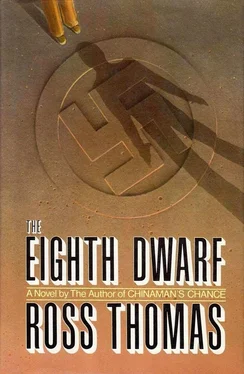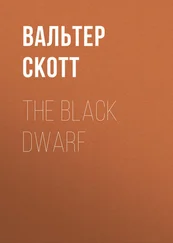The Casino was located just behind the seven-story I.G. Farben building, which was headquarters for the United States Forces, European Theater — or USFET, as it was called. After his lunch of chicken-fried steak, whatever that was, Baker-Bates had an appointment with Lt. LaFollette Meyer, whose office was in the Farben building. Meyer was to take him for a look at the house where the black-marketeer had been killed. What was his name? Damm. Karl-Heinz Damm. For a fleeting moment, Baker-Bates felt a small twinge of sympathy for the dead man — not because he had been murdered, but because he had had to bear up under a hyphenated name.
“Buy you a drink, Major?”
Baker-Bates turned toward the American voice that had made the offer. It came from a tallish, slim man with a major’s oak leaves on his shoulders and eyes that were more green than blue. About thirty-three, Baker-Bates thought as he debated whether to accept the offer.
“I’m just celebrating my promotion,” the American said, sensing the hesitation.
“In that case, I’ll be most happy to join you. Thank you very much.”
“What’re you drinking?”
“Scotch and soda,” Baker-Bates said. “But no ice this time, please.”
“Two Scotch and sodas, Sammy,” the new Major ordered from the Sergeant bartender. “And hold the ice on one.”
“Two Scotch sodas and hold the ice on one,” the Sergeant echoed. He mixed the drinks quickly with an expert’s minimal motion and slid them across the bar. “Congratulations on your promotion, Major,” Sammy said. “This one’s on the house.”
The new Major thanked the bartender with a thanks-a-lot and lifted his glass to Baker-Bates. “Mud in your eye, whatever that means.”
“I’ve never quite figured that one out myself,” Baker-Bates said.
“Thanks for having the drink with me,” the new Major said. “I’ve been hanging around here in limbo for about three weeks waiting for my orders to come through, and about the only person I’ve gotten to know is Sammy here. Sammy listens to my problems — right, Sammy?”
“Right, Major,” the Sergeant said with a good bartender’s automatic indulgence.
“You’re not assigned here, then?” Baker-Bates said.
“Nope. Just a casual. But my orders came through along with my promotion this morning, and tomorrow I’m off to Berlin.”
“That should be interesting.”
“Yeah, I think it might be. Where’re you stationed?”
“Place called Lübeck, up north.”
“Don’t believe I know that one.”
“Not too bad a place. A bit crowded now. We hit it during the raids, but not too much. Where’re you from in the States?”
“Texas, Abilene, Texas.”
“If you don’t mind my saying so, you don’t sound much like a Texan.”
The new Major grinned. “Before the war I was a radio announcer. They sort of like you to talk pretty.” He lapsed into a drawl and said, “But when I’m of a mind to, I can talk Texan prid near as good as anybody.”
Baker-Bates smiled. “Almost incomprehensible. Not quite, but almost.”
“Must sound to you like Cockney sounds to me.”
“Probably.”
“Well, sir,” the new Major said, finishing his drink, “it’s been real nice talking to you.”
“Thank you very much for the drink, and congratulations again. On your promotion.”
The new Major gave the bar a small slap with the palm of his hand. “Appreciate that,” he said with a smile, drawling the words out in a mock-Texas accent, turned, and wandered off into the crowd of lunchtime drinkers.
At lunch, Baker-Bates discovered that chicken-fried steak wasn’t quite as bad as it looked or sounded, although the gravy that came with it had the texture, the appearance, and possibly the flavor of library paste.
A German waiter came by and refilled Baker-Bates’s coffee cup without asking. Baker-Bates leaned back in his chair, lit a Lucky Strike, and gazed out over the crowded dining room. They do do themselves well, he thought. The best-paid, best-fed, best-equipped amateur army in the history of the world. And already demobilized. An army totally uneasy in its role of conqueror and slipping now, almost unconsciously, into the more comfortable role of liberator. And why not? Liberators are liked, conquerors aren’t, and the Americans do so want and need to be liked, even by yesterday’s enemies.
The new Major, for example. Not a bad chap for an American. A bit lonely, a bit overly friendly, but pleasant enough, without being completely overbearing, as so many of them were. All the new Major had wanted was a friendly face to help him celebrate his promotion. A radio announcer. Baker-Bates tried to imagine the life of a radio announcer, whatever that was, in a place called Abilene, Texas, but failed utterly. What did he announce — the news? But one doesn’t announce the news; one simply reads it, in a rather bored manner, as they did on the BBC. Baker-Bates sighed; finished his coffee; ground out his cigarette; watched as the German waiter swooped down on it, removed the butt, deposited it quickly in a small tin box that he took from his pocket, cleaned the ashtray, and put it back on the table.
Baker-Bates glanced at his watch and thought about his next American of the afternoon, Lt. LaFollette Meyer. Well, Lieutenant Meyer wasn’t one of your overly friendly Americans. Lieutenant Meyer was a very self-contained young man, a bit cool, a bit distant, who had a brain that he didn’t at all seem to mind using. Lieutenant Meyer, Baker-Bates thought with approval, was looking out for Lieutenant Meyer. He would have to tell him about the dwarf this afternoon. That should cause a tremor in all that cool composure. The dwarf, in that one respect at least, was really quite useful.
The lift in the I.G. Farben building was an open-shaft, endless-belted affair with platforms that had to be hopped onto. Baker-Bates hopped onto one and rode it up to the third floor, where he hopped off. A staff sergeant jerked a thumb over his shoulder at Lieutenant Meyer’s office, and Baker-Bates went in. The Lieutenant was seated behind his desk wearing a very large, but quite humorless, smile.
“I was looking for Lieutenant Meyer,” Baker-Bates said, “But I seem to have come across the Cheshire Cat.”
“Meow, sir.”
“You have something, I take it — something that I don’t have but wish to God that I did.”
“Exactly.”
“But you are going to share, aren’t you, Lieutenant?”
“I’m still savoring it, Major.”
“That tasty, eh?”
“Scrumptious.”
“This could go on all afternoon.”
“A picture.”
“Well, now.”
“A photograph. To be more precise, a snapshot.”
“Where was it?”
“We finally located someone who knew someone who knew him. And this someone who knew him had managed to hang on to a photo album. In fact, that’s all he managed to hang on to, but there, on the fifth from the last page, was a photograph taken in 1936 in Darmstadt.”
Lieutenant Meyer reached under the blotter on his desk and flipped a photograph over to Baker-Bates. “Meet Kurt Oppenheimer at twenty-two.”
The photograph was of a young man with rolled-up sleeves, leather shorts, and heavy shoes. He sat astride a bicycle. His mouth was open as if he were about to say something jocular. He was about six feet tall and, even in the photograph, looked tanned and fit.
Baker-Bates took only one look at the photograph before he softly said, “Damn!” And then, not quite so softly, “Goddamn sonofabitch!”
For the face in the photograph, although ten years younger, was the same as that of the new American Major from Abilene, Texas, who had bought Baker-Bates a drink only an hour and thirteen minutes before.
Читать дальше












